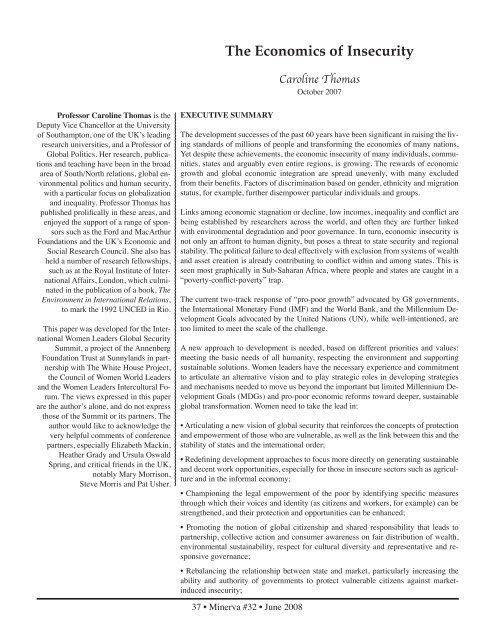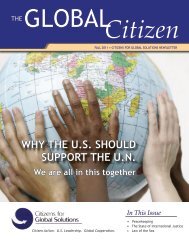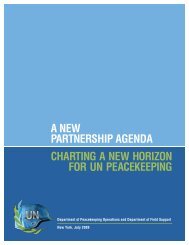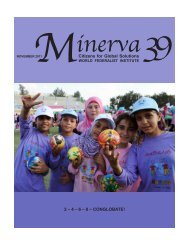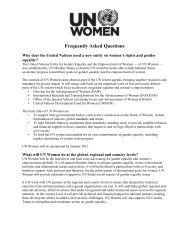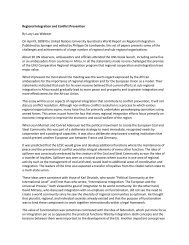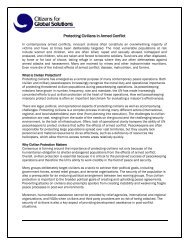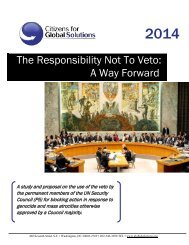Minerva, Spring 2008 (Volume 32) - Citizens for Global Solutions
Minerva, Spring 2008 (Volume 32) - Citizens for Global Solutions
Minerva, Spring 2008 (Volume 32) - Citizens for Global Solutions
You also want an ePaper? Increase the reach of your titles
YUMPU automatically turns print PDFs into web optimized ePapers that Google loves.
The Economics of Insecurity<br />
Caroline Thomas<br />
October 2007<br />
Professor Caroline Thomas is the<br />
Deputy Vice Chancellor at the University<br />
of Southampton, one of the UK’s leading<br />
research universities, and a Professor of<br />
<strong>Global</strong> Politics. Her research, publications<br />
and teaching have been in the broad<br />
area of South/North relations, global environmental<br />
politics and human security,<br />
with a particular focus on globalization<br />
and inequality. Professor Thomas has<br />
published prolifically in these areas, and<br />
enjoyed the support of a range of sponsors<br />
such as the Ford and MacArthur<br />
Foundations and the UK’s Economic and<br />
Social Research Council. She also has<br />
held a number of research fellowships,<br />
such as at the Royal Institute of International<br />
Affairs, London, which culminated<br />
in the publication of a book, The<br />
Environment in International Relations,<br />
to mark the 1992 UNCED in Rio.<br />
This paper was developed <strong>for</strong> the International<br />
Women Leaders <strong>Global</strong> Security<br />
Summit, a project of the Annenberg<br />
Foundation Trust at Sunnylands in partnership<br />
with The White House Project,<br />
the Council of Women World Leaders<br />
and the Women Leaders Intercultural Forum.<br />
The views expressed in this paper<br />
are the author’s alone, and do not express<br />
those of the Summit or its partners. The<br />
author would like to acknowledge the<br />
very helpful comments of conference<br />
partners, especially Elizabeth Mackin,<br />
Heather Grady and Ursula Oswald<br />
<strong>Spring</strong>, and critical friends in the UK,<br />
notably Mary Morrison,<br />
Steve Morris and Pat Usher.<br />
EXECUTIVE SUMMARY<br />
The development successes of the past 60 years have been significant in raising the living<br />
standards of millions of people and trans<strong>for</strong>ming the economies of many nations.<br />
Yet despite these achievements, the economic insecurity of many individuals, communities,<br />
states and arguably even entire regions, is growing. The rewards of economic<br />
growth and global economic integration are spread unevenly, with many excluded<br />
from their benefits. Factors of discrimination based on gender, ethnicity and migration<br />
status, <strong>for</strong> example, further disempower particular individuals and groups.<br />
Links among economic stagnation or decline, low incomes, inequality and conflict are<br />
being established by researchers across the world, and often they are further linked<br />
with environmental degradation and poor governance. In turn, economic insecurity is<br />
not only an affront to human dignity, but poses a threat to state security and regional<br />
stability. The political failure to deal effectively with exclusion from systems of wealth<br />
and asset creation is already contributing to conflict within and among states. This is<br />
seen most graphically in Sub-Saharan Africa, where people and states are caught in a<br />
“poverty-conflict-poverty” trap.<br />
The current two-track response of “pro-poor growth” advocated by G8 governments,<br />
the International Monetary Fund (IMF) and the World Bank, and the Millennium Development<br />
Goals advocated by the United Nations (UN), while well-intentioned, are<br />
too limited to meet the scale of the challenge.<br />
A new approach to development is needed, based on different priorities and values:<br />
meeting the basic needs of all humanity, respecting the environment and supporting<br />
sustainable solutions. Women leaders have the necessary experience and commitment<br />
to articulate an alternative vision and to play strategic roles in developing strategies<br />
and mechanisms needed to move us beyond the important but limited Millennium Development<br />
Goals (MDGs) and pro-poor economic re<strong>for</strong>ms toward deeper, sustainable<br />
global trans<strong>for</strong>mation. Women need to take the lead in:<br />
• Articulating a new vision of global security that rein<strong>for</strong>ces the concepts of protection<br />
and empowerment of those who are vulnerable, as well as the link between this and the<br />
stability of states and the international order;<br />
• Redefining development approaches to focus more directly on generating sustainable<br />
and decent work opportunities, especially <strong>for</strong> those in insecure sectors such as agriculture<br />
and in the in<strong>for</strong>mal economy;<br />
• Championing the legal empowerment of the poor by identifying specific measures<br />
through which their voices and identity (as citizens and workers, <strong>for</strong> example) can be<br />
strengthened, and their protection and opportunities can be enhanced;<br />
• Promoting the notion of global citizenship and shared responsibility that leads to<br />
partnership, collective action and consumer awareness on fair distribution of wealth,<br />
environmental sustainability, respect <strong>for</strong> cultural diversity and representative and responsive<br />
governance;<br />
• Rebalancing the relationship between state and market, particularly increasing the<br />
ability and authority of governments to protect vulnerable citizens against marketinduced<br />
insecurity;<br />
37 • <strong>Minerva</strong> #<strong>32</strong> • June <strong>2008</strong>


